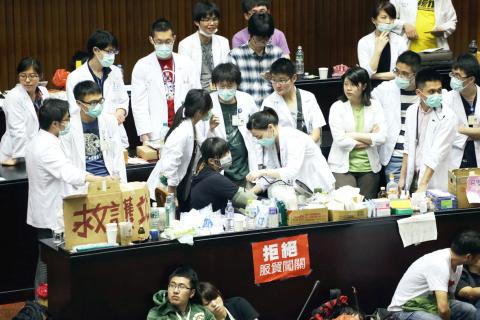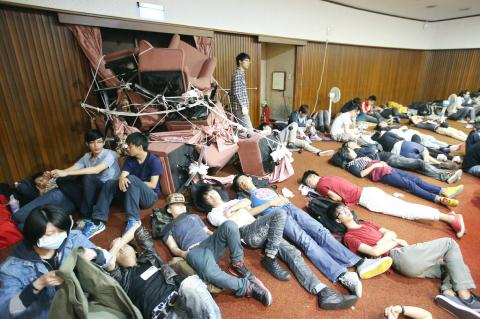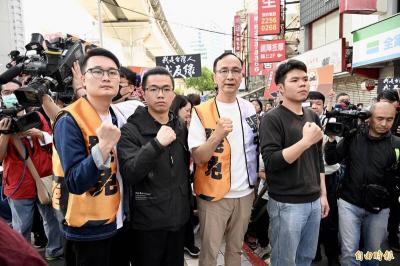The air quality in the Legislative Yuan’s main chamber has reached a hazardous level and could endanger the hundreds of students and activists who have occupied it since Tuesday night, Democratic Progressive Party (DPP) lawmakers said yesterday, urging that the air conditioners in the room be turned on.
“With about 300 students and dozens of reporters packed inside the chamber since Tuesday night, air quality — a basic human requirement — has become poor. We call on the Legislative Yuan to deal with the issue immediately,” DPP Legislator Tsai Chi-chang (蔡其昌) told a press conference in Taipei.
Legislative Yuan staff have refused to turn on the air conditioners because a legislative meeting is not being held in the chamber.

Photo: Fang Pin-chao, Taipei Times
DPP Legislator Chao Tien-lin (趙天麟) said an on-site inspection showed that the carbon dioxide level in the room has reached 1,600 parts per million (ppm), which is much higher than the maximum permitted by law — 1,000ppm — while the carbon dioxide level in the corridor outside the chamber is a normal 400ppm.
DPP Legislator Gao Jyh-peng (高志鵬) said the party’s caucus had raised the issue with the legislature’s employees, but was having trouble locating the appropriate officials, and believed the Legislative Yuan was using the lack of air conditioning as a tactic to punish the protesters.
Tsai Wei-min (蔡衛民), a member of the Legislative Yuan’s General Affairs Department, said the department would consider turning on the air-conditioners after an on-site inspection.

Photo: CNA
Air quality was not the only issue raised by protesters and opposition parties. They said they suspect the authorities have interfered with the Wi-Fi bandwidth around the Legislative Yuan compound, making it difficult for them to communicate through their smartphones and laptops.
They say communications have also been hindered by a lack of working electrical outlets in the chamber, some of which appear to have been tampered with to prevent protesters from recharging their mobile phones and other equipment.

Photo: CNA

The Ministry of Economic Affairs has fined Taobao NT$1.2 million (US$36,900) for advertisements that exceeded its approved business scope and ordered the Chinese e-commerce platform to make corrections in the first half of this year or its license would be revoked. Lawmakers have called for stricter supervision of Chinese e-commerce platforms and more stringent measures to prevent China from laundering its goods through Taiwan as US President Donald Trump’s administration cracks down on origin laundering. The legislature’s Finance Committee yesterday met to discuss policies to prevent China from dumping goods in Taiwan, inviting government agencies to report on the matter. Democratic Progressive Party

Taiwan and its Pacific ally Tuvalu on Tuesday signed two accords aimed at facilitating bilateral cooperation on labor affairs, according to Taiwan’s Ministry of Foreign Affairs (MOFA). The governments inked two agreements in Taipei, witnessed by Foreign Minister Lin Chia-lung (林佳龍) and visiting Deputy Tuvaluan Prime Minister Panapasi Nelesone, MOFA said in a news release. According to MOFA, the agreements will facilitate cooperation on labor issues and allow the two sides to mutually recognize seafarers’ certificates and related training. Taiwan would also continue to collaborate with Tuvalu across various fields to promote economic prosperity as well as the well-being of their

The Taipei District Prosecutors’ Office has continued its investigation into allegations of forged signatures in recall efforts today by searching the Chinese Nationalist Party’s (KMT) city chapter and questioning several personnel including the chapter director, according to media reports. Among those questioned and detained were KMT Taipei chapter director Huang Lu Chin-ju (黃呂錦茹), chapter secretary-general Chu Wen-ching (初文卿), chapter secretary Yao Fu-wen (姚富文) and first district committee executive director Tseng Fan-chuan (曾繁川). Prosecutors said they would not confirm reports about who had been summoned. The investigation centers on allegations that the ongoing recall campaigns targeting Democratic Progressive Party legislators Rosalia Wu (吳思瑤)

Several Chinese Nationalist Party (KMT) officials including Chairman Eric Chu (朱立倫) are to be summoned for questioning and then transferred to prosecutors for holding an illegal assembly in Taipei last night, the Taipei Police said today. Chu and two others hosted an illegal assembly and are to be requested to explain their actions, the Taipei City Police Department's Zhongzheng (中正) First Precinct said, referring to a protest held after Huang Lu Chin-ju (黃呂錦茹), KMT Taipei's chapter director, and several other KMT staffers were questioned for alleged signature forgery in recall petitions against Democratic Progressive Party (DPP) legislators. Taipei prosecutors had filed